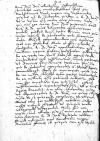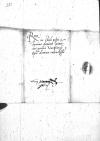Fuit hic Bartholomeus Vogt (Bartholomeus Voigt, Bartholomeus Voit) ⌊Bartholomeus VogtBartholomeus Vogt (Bartholomeus Voigt, Bartholomeus Voit) ⌋. Magna cum vehementia questus est de sententia quadam a Reverendissima Dominatione Vestra, ut ei visum est, contra iuris formam lata. Quicum ego coram Samuel Maciejowski (*1499 – †1550), humanist and diplomat, one of the most trusted advisors to King Sigismund I and then to his son Sigismund II Augustus; from 1521 Canon of the Collegiate Chapter in Sandomierz, and from 1530 in Kielce; from 1531 Canon of Gniezno; from 1532 or 1533 to 1537 royal secretary (previously scribe at the royal chancellery); 1537-1539 Grand Secretary; 1539-1547 Crown Vice-Chancellor; 1539-1541 Bishop of Chełm; 1541-1545 Bishop of Płock; 1545-1550 Bishop of Cracow; 1547-1550 Crown Grand Chancellor; in 1532 royal envoy to Rome; in 1534 and 1538 royal envoy to the local diets (WYCZAŃSKI 1990, p. 257-258; Urzędnicy 10, p. 184; PSB 19 Machowski - Maria Kazimiera, p. 64-69)⌊reverendissimo dominoSamuel Maciejowski (*1499 – †1550), humanist and diplomat, one of the most trusted advisors to King Sigismund I and then to his son Sigismund II Augustus; from 1521 Canon of the Collegiate Chapter in Sandomierz, and from 1530 in Kielce; from 1531 Canon of Gniezno; from 1532 or 1533 to 1537 royal secretary (previously scribe at the royal chancellery); 1537-1539 Grand Secretary; 1539-1547 Crown Vice-Chancellor; 1539-1541 Bishop of Chełm; 1541-1545 Bishop of Płock; 1545-1550 Bishop of Cracow; 1547-1550 Crown Grand Chancellor; in 1532 royal envoy to Rome; in 1534 and 1538 royal envoy to the local diets (WYCZAŃSKI 1990, p. 257-258; Urzędnicy 10, p. 184; PSB 19 Machowski - Maria Kazimiera, p. 64-69)⌋ pugnavi. Litteras Vestrae Reverendissimae Dominationis, quas diligenter asservaveram, protuli, quibus docui, tertio demum anno eum queri coepisse de sententia ante biennium lata. Quod quemadmodum Samuel Maciejowski (*1499 – †1550), humanist and diplomat, one of the most trusted advisors to King Sigismund I and then to his son Sigismund II Augustus; from 1521 Canon of the Collegiate Chapter in Sandomierz, and from 1530 in Kielce; from 1531 Canon of Gniezno; from 1532 or 1533 to 1537 royal secretary (previously scribe at the royal chancellery); 1537-1539 Grand Secretary; 1539-1547 Crown Vice-Chancellor; 1539-1541 Bishop of Chełm; 1541-1545 Bishop of Płock; 1545-1550 Bishop of Cracow; 1547-1550 Crown Grand Chancellor; in 1532 royal envoy to Rome; in 1534 and 1538 royal envoy to the local diets (WYCZAŃSKI 1990, p. 257-258; Urzędnicy 10, p. 184; PSB 19 Machowski - Maria Kazimiera, p. 64-69)⌊ipseSamuel Maciejowski (*1499 – †1550), humanist and diplomat, one of the most trusted advisors to King Sigismund I and then to his son Sigismund II Augustus; from 1521 Canon of the Collegiate Chapter in Sandomierz, and from 1530 in Kielce; from 1531 Canon of Gniezno; from 1532 or 1533 to 1537 royal secretary (previously scribe at the royal chancellery); 1537-1539 Grand Secretary; 1539-1547 Crown Vice-Chancellor; 1539-1541 Bishop of Chełm; 1541-1545 Bishop of Płock; 1545-1550 Bishop of Cracow; 1547-1550 Crown Grand Chancellor; in 1532 royal envoy to Rome; in 1534 and 1538 royal envoy to the local diets (WYCZAŃSKI 1990, p. 257-258; Urzędnicy 10, p. 184; PSB 19 Machowski - Maria Kazimiera, p. 64-69)⌋ inficias iret, non habebat. Quin et hoc ostendi a sententia Reverendissimae Dominationis Vestrae appellationem esse nullam. Neque habere potestatem quemquam de ea, recte an secus lata sit, cognoscendi. Contendebat Samuel Maciejowski (*1499 – †1550), humanist and diplomat, one of the most trusted advisors to King Sigismund I and then to his son Sigismund II Augustus; from 1521 Canon of the Collegiate Chapter in Sandomierz, and from 1530 in Kielce; from 1531 Canon of Gniezno; from 1532 or 1533 to 1537 royal secretary (previously scribe at the royal chancellery); 1537-1539 Grand Secretary; 1539-1547 Crown Vice-Chancellor; 1539-1541 Bishop of Chełm; 1541-1545 Bishop of Płock; 1545-1550 Bishop of Cracow; 1547-1550 Crown Grand Chancellor; in 1532 royal envoy to Rome; in 1534 and 1538 royal envoy to the local diets (WYCZAŃSKI 1990, p. 257-258; Urzędnicy 10, p. 184; PSB 19 Machowski - Maria Kazimiera, p. 64-69)⌊ipseSamuel Maciejowski (*1499 – †1550), humanist and diplomat, one of the most trusted advisors to King Sigismund I and then to his son Sigismund II Augustus; from 1521 Canon of the Collegiate Chapter in Sandomierz, and from 1530 in Kielce; from 1531 Canon of Gniezno; from 1532 or 1533 to 1537 royal secretary (previously scribe at the royal chancellery); 1537-1539 Grand Secretary; 1539-1547 Crown Vice-Chancellor; 1539-1541 Bishop of Chełm; 1541-1545 Bishop of Płock; 1545-1550 Bishop of Cracow; 1547-1550 Crown Grand Chancellor; in 1532 royal envoy to Rome; in 1534 and 1538 royal envoy to the local diets (WYCZAŃSKI 1990, p. 257-258; Urzędnicy 10, p. 184; PSB 19 Machowski - Maria Kazimiera, p. 64-69)⌋ nihilominus summa pertinacia, ut dominis Council of Royal Prussia the most important local authority in Royal Prussia. It consisted of two bishops (of Ermland (Warmia), who served as the Council’s president, and of Kulm (Chełmno)), three voivodes (of Kulm, Marienburg (Malbork), and Pomerania), three castellans (of Kulm, Elbing (Elbląg), and Gdańsk (Danzig)), three chamberlains (of Kulm, Marienburg, and Pomerania), and representatives of the three Great Prussian Cities – Gdańsk, Thorn (Toruń), and Elbing (ACHREMCZYK 2016, p. 17-18)⌊consiliariis terrarum PrussiaeCouncil of Royal Prussia the most important local authority in Royal Prussia. It consisted of two bishops (of Ermland (Warmia), who served as the Council’s president, and of Kulm (Chełmno)), three voivodes (of Kulm, Marienburg (Malbork), and Pomerania), three castellans (of Kulm, Elbing (Elbląg), and Gdańsk (Danzig)), three chamberlains (of Kulm, Marienburg, and Pomerania), and representatives of the three Great Prussian Cities – Gdańsk, Thorn (Toruń), and Elbing (ACHREMCZYK 2016, p. 17-18)⌋, quo de sententia cognosceretur, sacra Sigismund I Jagiellon (Zygmunt I) (*1467 – †1548), King of Poland and Grand Duke of Lithuania (1506-1548); Duke of Głogów (Glogau) (1499-1506), Duke of Opava (1501-1506), Governor of Silesia (1504-1506); son of King Kazimierz IV Jagiellon and Elisabeth of Austria⌊maiestas regiaSigismund I Jagiellon (Zygmunt I) (*1467 – †1548), King of Poland and Grand Duke of Lithuania (1506-1548); Duke of Głogów (Glogau) (1499-1506), Duke of Opava (1501-1506), Governor of Silesia (1504-1506); son of King Kazimierz IV Jagiellon and Elisabeth of Austria⌋ committeret. Idque eo argumento, quod qua de re nulla fuisset inter partes controversia, de ea nullum esse potuerit iudicium. Sed cum hoc impetrare non potuisset, effecit nihilominus importunitate sua, ut ei litterae regiae darentur, non alia sententia, quam ut admoneretur Reverendissima Dominatio Vestra, ne quam illis iuste de se querendi occasionem praeberet. Quas iam eos reddidisse arbitror. Adeo nobis molesti fuerunt, ut quoquo modo ablegandi viderentur.
Nova huc non pauca sunt allata, quae si nunc non potero, alio tempore Reverendissimae Dominationi Vestrae descripta mittam. Quod reliquum erat senatorum Lithuania⌊Magni DucatusLithuania⌋ huius, id quoque iam esse desiit.  AAWO, AB, D. 19, No. 23_2 Mortuus est dominus Jan Radziwiłł (*ca. 1474 – †1522), 1514 land marshall of Lithuania; 1522 castellan of Trakai; 1507, 1508 royal envoy to Muscovy (PSB 30/1, p. 191-192)⌊capitaneus SamogitiensisJan Radziwiłł (*ca. 1474 – †1522), 1514 land marshall of Lithuania; 1522 castellan of Trakai; 1507, 1508 royal envoy to Muscovy (PSB 30/1, p. 191-192)⌋. Iam nemo extat consiliariorum Lithuania⌊Magni DucatusLithuania⌋, praeter episcopos. Quid futurum sit, nescio. Sapia adhuc in arce est superiore hidden by binding⌈[e]e hidden by binding⌉. Francis I of Valois (*1494 – †1547), 1515-1547 King of France; son of Charles, Count of Angoulême, and Louise of Savoy⌊Rex GalliaeFrancis I of Valois (*1494 – †1547), 1515-1547 King of France; son of Charles, Count of Angoulême, and Louise of Savoy⌋ Avinionem dicitur occupasse et in Tergestina provincia portum quendam Ferdinand I of Habsburg (*1503 – †1564), from 1521 Archduke of Austria, from 1526 King of Bohemia and Hungary, Croatia and Slavonia as Ferdinand I, 1531-1558 King of the Romans, 1558-1564 Holy Roman Emperor; son of Philip I the Handsome and Joanna the Mad of Castile, a younger brother of Charles V of Habsburg⌊regis RomanorumFerdinand I of Habsburg (*1503 – †1564), from 1521 Archduke of Austria, from 1526 King of Bohemia and Hungary, Croatia and Slavonia as Ferdinand I, 1531-1558 King of the Romans, 1558-1564 Holy Roman Emperor; son of Philip I the Handsome and Joanna the Mad of Castile, a younger brother of Charles V of Habsburg⌋. Charles V of Habsburg (*1500 – †1558), ruler of the Burgundian territories (1506-1555), King of Spain as Charles I (1516-1556), King of Naples and Sicily, King of the Romans (1519-1530), Holy Roman Emperor of the German Nation (elected 1519, crowned 1530, abdicated 1556); son of Philip I the Handsome and Joanna the Mad of Castile⌊CaesarCharles V of Habsburg (*1500 – †1558), ruler of the Burgundian territories (1506-1555), King of Spain as Charles I (1516-1556), King of Naples and Sicily, King of the Romans (1519-1530), Holy Roman Emperor of the German Nation (elected 1519, crowned 1530, abdicated 1556); son of Philip I the Handsome and Joanna the Mad of Castile⌋ appullisse quidem salvus fertur in Spain (Hispania)⌊HispaniasSpain (Hispania)⌋, sed multis suis hidden by binding⌈[s]s hidden by binding⌉ navibus desideratis. The Ottoman Turks (Turcae) ⌊TurcaeThe Ottoman Turks (Turcae) ⌋ praedas agunt passim in Hungary (Kingdom of Hungary)⌊HungariaHungary (Kingdom of Hungary)⌋. Deus Christianorum contra illos conatus fortunet.
AAWO, AB, D. 19, No. 23_2 Mortuus est dominus Jan Radziwiłł (*ca. 1474 – †1522), 1514 land marshall of Lithuania; 1522 castellan of Trakai; 1507, 1508 royal envoy to Muscovy (PSB 30/1, p. 191-192)⌊capitaneus SamogitiensisJan Radziwiłł (*ca. 1474 – †1522), 1514 land marshall of Lithuania; 1522 castellan of Trakai; 1507, 1508 royal envoy to Muscovy (PSB 30/1, p. 191-192)⌋. Iam nemo extat consiliariorum Lithuania⌊Magni DucatusLithuania⌋, praeter episcopos. Quid futurum sit, nescio. Sapia adhuc in arce est superiore hidden by binding⌈[e]e hidden by binding⌉. Francis I of Valois (*1494 – †1547), 1515-1547 King of France; son of Charles, Count of Angoulême, and Louise of Savoy⌊Rex GalliaeFrancis I of Valois (*1494 – †1547), 1515-1547 King of France; son of Charles, Count of Angoulême, and Louise of Savoy⌋ Avinionem dicitur occupasse et in Tergestina provincia portum quendam Ferdinand I of Habsburg (*1503 – †1564), from 1521 Archduke of Austria, from 1526 King of Bohemia and Hungary, Croatia and Slavonia as Ferdinand I, 1531-1558 King of the Romans, 1558-1564 Holy Roman Emperor; son of Philip I the Handsome and Joanna the Mad of Castile, a younger brother of Charles V of Habsburg⌊regis RomanorumFerdinand I of Habsburg (*1503 – †1564), from 1521 Archduke of Austria, from 1526 King of Bohemia and Hungary, Croatia and Slavonia as Ferdinand I, 1531-1558 King of the Romans, 1558-1564 Holy Roman Emperor; son of Philip I the Handsome and Joanna the Mad of Castile, a younger brother of Charles V of Habsburg⌋. Charles V of Habsburg (*1500 – †1558), ruler of the Burgundian territories (1506-1555), King of Spain as Charles I (1516-1556), King of Naples and Sicily, King of the Romans (1519-1530), Holy Roman Emperor of the German Nation (elected 1519, crowned 1530, abdicated 1556); son of Philip I the Handsome and Joanna the Mad of Castile⌊CaesarCharles V of Habsburg (*1500 – †1558), ruler of the Burgundian territories (1506-1555), King of Spain as Charles I (1516-1556), King of Naples and Sicily, King of the Romans (1519-1530), Holy Roman Emperor of the German Nation (elected 1519, crowned 1530, abdicated 1556); son of Philip I the Handsome and Joanna the Mad of Castile⌋ appullisse quidem salvus fertur in Spain (Hispania)⌊HispaniasSpain (Hispania)⌋, sed multis suis hidden by binding⌈[s]s hidden by binding⌉ navibus desideratis. The Ottoman Turks (Turcae) ⌊TurcaeThe Ottoman Turks (Turcae) ⌋ praedas agunt passim in Hungary (Kingdom of Hungary)⌊HungariaHungary (Kingdom of Hungary)⌋. Deus Christianorum contra illos conatus fortunet.
Qui et Reverendissimam Vestram Dominationem in multos annos servet incolumem et hidden by binding⌈[et]et hidden by binding⌉ felicem. Cuius me me gratiae commendo.
 AAWO, AB, D. 19, No. 23_2 Mortuus est dominus
AAWO, AB, D. 19, No. 23_2 Mortuus est dominus 

